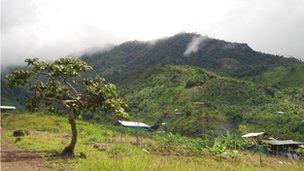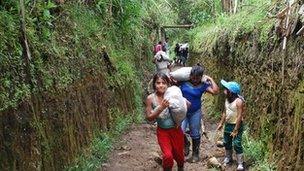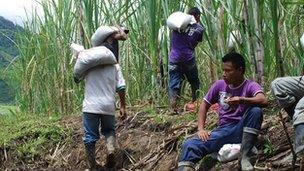Colombia's indigenous peoples face uncertain future
- Published

The Awa call themselves "people from the mountains"
A group of men, women and children walk up a muddy hill carrying heavy bags filled with sand.
They all belong to the Awa tribe: indigenous people displaced by the Colombian conflict who are trying to build a new life.
Violence forced them out of their homeland in the mountains. Now they are trying to settle on 127 hectares (313 acres) of land provided by the government on the outskirts of Ricaurte, a small town in the south-western province of Narino.
We are half way between the Ecuadorean border and the Pacific Ocean, in a key territory for the Farc and ELN guerrilla groups, and for paramilitary drug trafficking gangs.
This is a corridor for drugs, weapons and, increasingly, armed men.
The Colombian army has reinforced its presence in the region and - as often happens in Colombia - the local indigenous communities have been the most affected by the escalation of the conflict.

Indigenous people are building new settlements after being displaced by conflict
"There are really serious clashes. We fear for human and material losses. That's why we had to flee our land," said Carlos Ortiz, the deputy governor of El Eden-Cartagena settlement.
This newly-created settlement is home to 150 Awa families, who have arrived from different indigenous reservations.
In total, more than 3,000 Awa - almost 10% of their total number - have been displaced by the Colombian conflict during the last decade.
Community leaders have also been murdered and landmines scattered in their territory.
Three mass killings that left 33 dead were reported in 2009 alone, and the Awa blame the Farc, paramilitary groups and the army for each of them.
The Awa people rank high in the list of 35 Colombian indigenous communities threatened by extinction because of the conflict published by the Colombian Constitutional Court.
Like the Nukak Maku people in Guaviare, the Hitnu in Arauca, the Nasa in Cauca and the Embera in Choco, the Awa are victims of the strategic importance that their territories hold for rebels and drug traffickers.
And they also suffer from outsiders coveting the natural resources found on their land.
The Awa started to fight the takeover of their territories for palm oil plantations 16 years ago.
"Lately we are also worried about gold mining," said Rider Pai, one of the leaders of Indigenous Union of the Awa People (UNIPA), founded in 1985.
Although gold is found in Awa land, it is not yet attracting big multinational companies.
But in Choco mining operations have affected the environment as well as the traditions of the Embera indigenous community, forcing them from places they consider sacred.
Oil has become a problem for indigenous communities such as the U'Wa, who live in the eastern provinces of Arauca, Casanare, Santander, Norte de Santander and Boyaca.
Whatever the situation, the pattern is always the same: outside groups move in, forcing the indigenous people either to leave or live amid conflict.
According to the United Nations refugee agency (UNHCR), 2% of Colombians displaced by the conflict belong to indigenous ethnic groups.
Far from their homeland, they are particularly exposed to hunger and diseases, and they struggle to keep their traditions.
For the Awa - who call themselves "the people from the mountains" - this separation seems to be especially painful.
They have such strong ties to the mountains that some refuse to leave their homeland, despite the fighting.
But the cost of staying put is high. Seven people, including children, have died in landmine explosions in the last two years.
"If there were no mines, we wouldn't have left our land," says Jose Chingal, who fled his home in the Magui indigenous reservation.
Those who have left are determined to cope as best they can.
"That's because an Indian without land is not an Indian," says Mr Ortiz, recalling the years of paperwork needed to get the government to grant them land where his community is building El Eden-Cartagena settlement.

Once semi-nomadic, Awa people are cultivating sugar cane and other fruits and vegetables
"In the reservation we had everything, there was no need to buy anything. But here, even finding a job is hard," Mr Ortiz told the BBC.
The community is using their new land to grow bananas and sugar cane.
They also have plans to produce fruit and vegetables and they want to set up a small sugar mill.
And the sand carried by the people we met on the road was to help build a chicken shed.
All this, however, is a completely new experience for the members of this semi-nomadic community of hunters and gatherers who live scattered across the provinces of Narino and Putumayo and in the neighbouring mountains of Ecuador.
"We have not lost the hope to go back to our land some day. Our roots, our land, everything is there," Mr Ortiz said.
"But we think that will happen in the long term. It's not going to happen tomorrow as the situation has not improved and the conflict is alive."
- Published15 November 2011
- Published27 October 2011
- Published18 September 2010